

It assumes:
– slow technological change and innovation
– low levels of mobility (people, ideas an capital) so that technology diffuses slowly around the world
– development of renewable energy technologies are delayed and are not shared widely between trade blocs;
– delayed land use improvements for agriculture until very late in the scenario (close to 2100);
– a rebound in human population demographics resulting in human population of 15 billion in 2100; and
– a 10 fold increase in the use of coal as a power source and a move away from natural gas as an energy source.
Climate Discussion Nexus. John Robson If you’ve been anywhere near a TV or a radio or a computer in the past few years, you’ll have heard some shocking warnings about climate change that are “based on the science”.
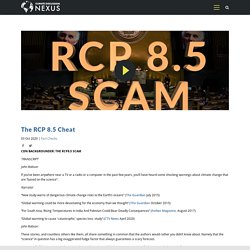
Narrator “New study warns of dangerous climate change risks to the Earth’s oceans” (The Guardian July 2015) “Global warming could be more devastating for the economy than we thought” (The Guardian October 2015) “For South Asia, Rising Temperatures In India And Pakistan Could Bear Deadly Consequences” (Forbes Magazine, August 2017) “Global warming to cause 'catastrophic' species loss: study” (CTV News April 2020) These stories, and countless others like them, all share something in common that the authors would rather you didn’t know about. Climate Discussion Nexus. Would you stop it?
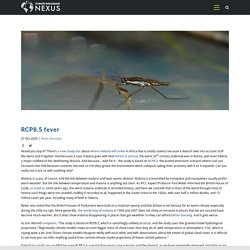
There’s a new study out about where malaria will strike in Africa that is totally useless because it doesn’t take into account stuff like dams and irrigation. And because it says malaria goes with heat which is untrue; the worst 20th-century outbreak was in Russia, with even Siberia a major coldbed of this debilitating disease. Fooling Us With Climate Trickery. An influential report aimed at business leaders re-labelled an implausible, far-fetched scenario as ‘our current path.’
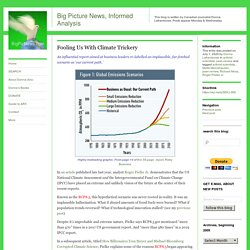
In an article published late last year, analyst Roger Pielke Jr. demonstrates that the US National Climate Assessment and the Intergovernmental Panel on Climate Change (IPCC) have placed an extreme and unlikely vision of the future at the center of their recent reports. Known as the RCP8.5, this hypothetical scenario was never rooted in reality. It was an implausible hallucination. What if absurd amounts of fossil fuels were burned? What if population trends reversed? How the Ugliest Climate Fairy Tale Won. A preposterous climate yarn has taken center stage.
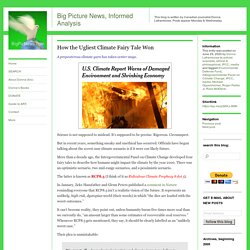
Science is not supposed to mislead. It’s supposed to be precise. Rigorous. Circumspect. But in recent years, something sneaky and unethical has occurred. More than a decade ago, the Intergovernmental Panel on Climate Change developed four fairy tales to describe how humans might impact the climate by the year 2100. Ross McKitrick: The Flaw In Relying On Worst-Case Climate Modelling.
The purpose of global climate policy is to get us from the dangerous upper end of the forecast range down to the safe bottom end.
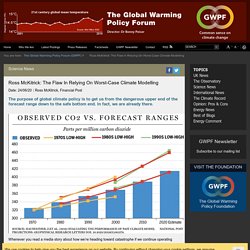
In fact, we are already there. Whenever you read a media story about how we’re heading toward catastrophe if we continue operating “business as usual” — i.e., if we don’t slash carbon emissions — the reports are almost always referring to a model simulation using RCP8.5. And you can bet that nowhere in the story will they explain that RCP8.5 is an implausible worst-case scenario that was never meant to represent a likely base case outcome, or that scientists have begun castigating its usage as a prediction of a doomed business-as-usual future. The term RCP8.5 refers to a greenhouse gas emissions scenario often used by scientists for climate model projections. Climate science does an about-face: dials back the ‘worst case scenario’ Worst-Case Emissions Scenario RCP8.5 Is Dead: BBC. BBC News this week rang down the curtain on the climate science fraternity’s long running malpractice of projecting climate change impacts using a worst-case emissions scenario as if it were a business-as-usual scenario.
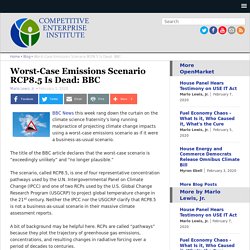
The title of the BBC article declares that the worst-case scenario is “exceedingly unlikely” and “no longer plausible.” The scenario, called RCP8.5, is one of four representative concentration pathways used by the U.N. Intergovernmental Panel on Climate Change (IPCC) and one of two RCPs used by the U.S. Global Change Research Program (USGCRP) to project global temperature change in the 21st century. Is our certain fate a coal-burning climate apocalypse? No! The United Nations Climate Change Conference (COP21) in Paris climate was preceded by a surge of studies and articles warning of a dismal future if we do not take strong policy action.
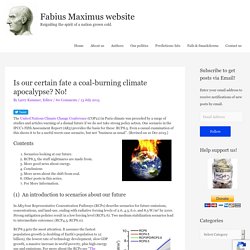
One scenario in the IPCC’s Fifth Assessment Report (AR5) provides the basis for these: RCP8.5. Even a casual examination of this shows it to be a useful worst-case scenario, but not “business as usual”. {Revised on 10 Dec 2015.} Bloomberg: RCP8.5 Climate Catastrophe is Unlikely – Because of Cheap Renewables. Guest essay by Eric Worrall According to Bloomberg columnist Noah Smith, untold suffering is pretty much locked in, but we won’t have to dismantle Capitalism, because cheap solar energy will soon eliminate the need for fossil fuel.
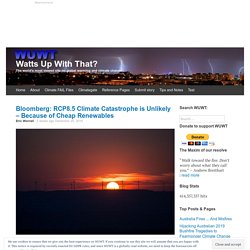
Worst Case for Climate Change Doesn’t Look RealisticA major overhaul of energy production is still needed, but not a dismantling of capitalism. By Noah Smith…But a growing chorus of climate scientists and energy policy analysts has begun to question whether the dreaded RCP8.5 scenario should be taken seriously. The scenario assumes that after a brief flirtation with natural gas and renewable energy, the world returns to fueling industrialization primarily with coal. But it seems vanishingly unlikely that the global coal industry will increase sevenfold, as RCP8.5 envisions, even if natural gas proves to be a temporary phenomenon.First of all, there probably just isn’t that much accessible coal in the ground. Like this: More growth, less warming. The only way to get dangerous global warming is to assume stagnation Here's a version of the article I published in the Financial Post this week with added links: The debate over climate change is horribly polarized.
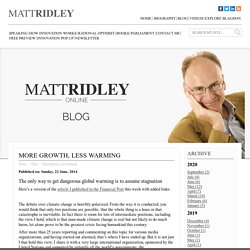
From the way it is conducted, you would think that only two positions are possible: that the whole thing is a hoax or that catastrophe is inevitable. In fact there is room for lots of intermediate positions, including the view I hold, which is that man-made climate change is real but not likely to do much harm, let alone prove to be the greatest crisis facing humankind this century. After more than 25 years reporting and commenting on this topic for various media organizations, and having started out alarmed, that’s where I have ended up. Now two degrees [above pre-indistrial levels] is the threshold at which warming starts to turn dangerous, according to the scientific consensus. But what about the fourth scenario? These are highly unlikely assumptions. Andrew Montford: Alarmism No More. Environmental correspondents make a good living from scare stories.
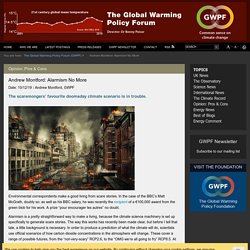
In the case of the BBC’s Matt McGrath, doubly so: as well as his BBC salary, he was recently the recipient of a €100,000 award from the green blob for his work. A prize “pour encourager les autres” no doubt. Alarmism is a pretty straightforward way to make a living, because the climate science machinery is set up specifically to generate scare stories. The way this works has recently been made clear, but before I tell that tale, a little background is necessary. In order to produce a prediction of what the climate will do, scientists use official scenarios of how carbon dioxide concentrations in the atmosphere will change. The Incredible Story Of How Climate Change Became Apocalyptic. Reposted with permission from Forbes Roger Pielke Energy. It’s Time To Get Real About The Extreme Scenario Used To Generate Climate Porn. Climate change that results from the combustion of fossil fuels poses significant risks to the Earth’s environment and human society.
Aggressive adaptation and mitigation policies make good sense. However, discussions of climate policy are thrown off track by the widespread misuse of an extreme climate scenario. The case for any policy action on any issue can be characterized as a forked-road situation, to paraphrase American pragmatist John Dewey, one which proposes alternatives. We discuss and debate which fork in the road to take, based on where we believe it will take us. In order to glean what the different destinations might look like, we often turn to experts to offer predictions or projections of the future, conditional on implementing alternative policy options. What’s the worst case? A possibilistic approach. By Judith Curry Are all of the ‘worst-case’ climate scenarios and outcomes described in assessment reports, journal publications and the media plausible?
Are some of these outcomes impossible? On the other hand, are there unexplored worst-case scenarios that we have missed, that could turn out to be real outcomes? Search Results. Is RCP8.5 an impossible scenario? By Judith Curry In considering ‘worst case’ climate change impacts, we first need to assess the realistic worst case for global carbon emissions. A closer look at scenario RCP8.5 by Larry Kummer The United Nations Climate Change Conference (COP21) in Paris climate was preceded by a surge of studies and articles warning of a dismal future if we do not take strong policy action.
One scenario in the IPCC’s … Continue reading. About the corruption of climate science. Summary: Today’s post tells about the corruption of yet another vital American institution – climate science. See how RCP8.5, a valuable worst-case scenario, has been misrepresented to incite fear in the American public. This is the first of my posts implementing my new view of America. ID 9523824 © Noahgolan | Dreamstime. “There are some 20,000 research papers listed on Google Scholar, a search engine for academics, that mention the worst-case scenario for climate change, one where an overpopulated, technology-poor world digs up all the coal it can find.
Basically, it’s the most cataclysmic estimate of global warming.” — Bloomberg News, 9 February 2018. RCP8.5 is the most severe of the four scenarios used in the IPCC’s AR5. Sea level rise whiplash. By Judith Curry Some recent sea level rise publications, with implications for how we think about the worst case scenario for the 21st century. Reassessing the RCPs. On RCP8.5 and "the Business as Usual" Scenario – Different beasts not to be confused. A closer look at scenario RCP8.5. What’s the worst case? Emissions/concentration scenarios. RCP 8.5: Is our certain fate a coal-burning climate apocalypse? No! RCP 8.5, Part Deux: “The stuff nightmares are made from.” Guest post by David Middleton Featured image borrowed from here. In light of the fact that I totally glossed over the distinction between “CO2” and “CO2 equivalent” in my previous post on RCP 8.5, I decided to pen a more serious post on the subject.
I will do my best to avoid humor. RCP 8.5: The “Mother of all” Junk Climate Science. Guest post by David Middleton. Is our certain fate a coal-burning climate apocalypse? No! Time to Cool It: The U.N.’s Moribund High-End Global Warming Emissions Scenario. The U.N. currently entertains four emissions scenarios, all expressed as the change in downwelling radiation (in watts/meter-sq, nominal year 2100) towards the surface that results from an increase in the atmospheric concentration of certain greenhouse gases.
…and Then There's Physics. U.S. Climate Resilience Tool Kit: Greenland Stays Frozen in 2100… Even Under RCP8.5. Guest DIY by David Middleton It looks like at least some of this money was well-spent. Is RCP8.5 an impossible scenario? Apocalypse Cancelled, Sorry, No Ticket Refunds. Guest Post by Willis Eschenbach Estimates of future atmospheric CO2 values as a result of future emissions, called “scenarios”, fall into two camps—demand driven, and supply driven. RCP 8.5 to Exterminate Antarctica’s Penguins by 2100!!!